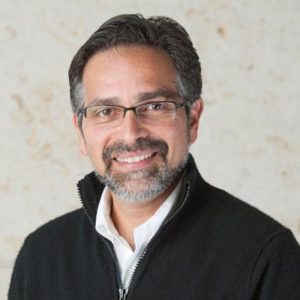
Why can’t human beings regrow an arm? That may seem ridiculous, but if salamanders and sea stars regenerate limbs and appendages as adults, why can’t humans? Research questions like this take a special kind of scientist with an unorthodox approach.
 Dr. Alejandro Sánchez Alvarado is a molecular biologist, and a Stowers Institute for Medical Research and Howard Hughes Medical Institute investigator. The Stowers Institute attracts researchers like Sánchez Alvarado because it offers an opportunity to be dedicated to basic discovery research and as he says, “has an appreciation for the usefulness of useless knowledge.” He has been with the Stowers Institute for seven years and sees the organization as unique and difficult to duplicate. Sánchez Alvarado also grew to love Kansas City on a level he never expected. “Not only is it a gracious and welcoming city, it also is a fantastic place to live, to raise a family, and to become engaged in the community,” Sánchez Alvarado said.
Dr. Alejandro Sánchez Alvarado is a molecular biologist, and a Stowers Institute for Medical Research and Howard Hughes Medical Institute investigator. The Stowers Institute attracts researchers like Sánchez Alvarado because it offers an opportunity to be dedicated to basic discovery research and as he says, “has an appreciation for the usefulness of useless knowledge.” He has been with the Stowers Institute for seven years and sees the organization as unique and difficult to duplicate. Sánchez Alvarado also grew to love Kansas City on a level he never expected. “Not only is it a gracious and welcoming city, it also is a fantastic place to live, to raise a family, and to become engaged in the community,” Sánchez Alvarado said.
With his research, Sánchez Alvarado and his team aim to shed some important light on how some organisms manifest the regeneration process but humans do not. “If we can turn the complex problem into a simpler one, then we might be able to make some headway in understanding what the molecular basis of regeneration may or may not be,” Sánchez Alvarado said. He studies a species of flatworm that comes from the Iberian Peninsula in an abandoned fountain in Barcelona. These animals are about the size of a toe nail clipping and if it is chopped up into 18 fragments, it will regenerate into 18 complete animals. “That would be like chopping off my little finger and watching my little finger regenerate me,” Sánchez Alvarado said. His team also studies a snail from the Brazilian tropics. “Their eyes are camera type eyes, like a human eye.” Sánchez Alvarado says. “You can chop those eyes off, and they’ll grow back.” Obviously, this is incredible, but the simpler question is what triggers this regeneration in them and why can’t it be triggered with more complex animals? His lab tests their findings on a fish species from the plains of Africa that reaches its adult state quickly. This allows their findings to be applied to gain a better understanding of why they can do it better than humans.
Sánchez Alvarado was born in Venezuela and became interested in science early on. Originally, he thought that he would become a physicist, but after he took a wonderfully taught Biology class, he changed his direction. “The fact that you can test and interrogate nature by doing a very simple and elegant experiment and that experiment can provide you with such depth and understanding of an incredibly complex problem,” Sánchez Alvarado said. “I was so smitten by this, I knew that was what I wanted to do.” After he finished high school in Venezuela, he focused on studying molecular biology, and that led him to Vanderbilt University in Nashville, TN. However, he had an obstacle: he didn’t speak English. He learned quickly but did not realize until later that the Southern twang was not a normal part of the language. The non-linear nature of his education and training brought him to Cincinnati for his PhD, to the Carnegie Institute of Washington in Baltimore, and to Salt Lake City at the School of Medicine in their department of Neurology and Anatomy before coming to Kansas City.
Sánchez Alvarado met his wife (also a scientist) in Massachusetts in 1995. They had their first child, a son, while they were in Baltimore and then their second child, a daughter, during their time in Salt Lake City. He is amazed at how fast they have grown up. His son started college this fall, and his daughter recently started her Junior year in high school. His son is studying to become a composer, and his daughter is very athletic and loves to be a part of a team. Alejandro carries his love of exploration into his personal life and his travels. He likes to look for fossils and might be the only traveler collecting water samples while on vacation for the microscope later. He also loves music, concerts, dabbling in the classical guitar and playing the ukulele. Even on his business trips, he wakes up early and runs to talk with locals and explore the best place to get a cup of coffee.
Dr. Sánchez Alvarado and his team keep asking simple yet profound questions that may lead to an answer that allows the human genome to regenerate as other creatures do. He welcomes and encourages the progress of his peers and fellow investigators. “This knowledge might look useless to you now, but give it 5, 10, even 15 years,” Sánchez Alvarado said. “This knowledge will be fundamental for fueling new industries and technologies. Discoveries aren’t made because you found something new, discoveries are made by seeing something new in something others have already seen.” His teams’ unorthodox approach and Sánchez Alvarado’s simple questions to complex problems might uncover captivating results.